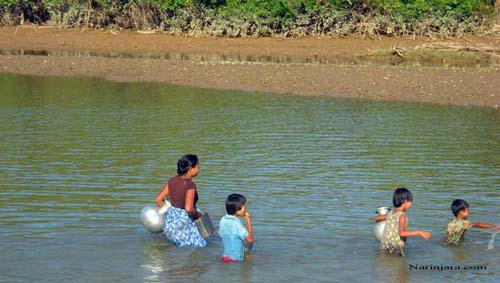Mray Bon: It will be one full year on the coming 22nd of October, since Cyclone Giri struck the Arakan Coast in western Burma, but the victims of that natural disaster are still being neglected by the Burmese government, who is offering no assistance in rehabilitation.
Victims from the townships of Kyaukpru, Mraybon, Ann and Pauktaw, which were hit hardest by the cyclone, are still suffering from the lack of shelter, adequate food, drinking water and proper health care.

A victim from Kyauntharyar village in Mraybon Township said that over half of the villagers in their village remain unable to rebuild the houses destroyed by the storm.
“The situation is still very bad in our village. We do not have enough food to eat and no houses to shelter in. The bad weather in this rainy season has added more troubles to our burden and more than half of our villagers are still unable to rebuild the houses destroyed by the cyclone last year”, said the villager.
Most of the people left victimized by Cyclone Giri in are poor farmers, growers and fishermen. The official newspapers of the Burmese regime reported almost every day just after the cyclone slammed into the Arakan coast that the regime was providing relief such as food and corrugated tin for reroofing destroyed houses in the cyclone affected areas.
However the villager said, “There was no government relief such as tin or other housing material to help the cyclone-affected peoples in our areas. The government provided some tin for reroofing the schools here, but it wasn't enough. Food was distributed by NGOs for nearly three months after the cyclone but we have so far received nothing more.”
As there has been no proper government relief and now the NGOs have stopped food distributions, the victims especially in the villages of Prunwann and Kyauntharyar in Mraybon Township have faced many difficulties in their day to day lives, and often skip meals.
The villager said that no paddy cultivation can be done in those villages since the cyclone destroyed the harvests and dykes of the paddy farms last year and so the villagers have to depend on rice being imported from other places in the region. A bag of the lowest quality rice costs over Kyat 20,000.
A Buddhist monk from Kyaukpru Township said the cyclone-affected people in his area are facing similar difficulties due to the lack of proper and adequate support from the government and NGOs.
“There is only ‘Save the Children’ and a local youth group still helping in the villages of Mauktonngree, Chaunggreephya and Shwenyoma, which were the worst hit in the area, but the government has done nothing for them, they haven't even reconstructed the damaged dykes. Now they have to do whatever jobs are available to them and many suffer from famine."
He said that nearly ten thousand acres of paddy farms could not be cultivated this rainy season because of the government’s negligence in repairing the damaged dykes, which are very important for the paddy farming in an area surrounded by salt water rivers and sea.
U Tak Tun Aung, an MP of the State Parliament from Pauktaw Township, said that the cyclone victims in his township are still facing many difficulties. “The people affected by the cyclone last year are still living in great difficulty, and we will present this issue to the State Parliament when it convenes this month”, said MP U Tak Tun Aung.
In neighboring Bangladesh, which is also prone to the tropical cyclones, the government usually undertakes the responsibly of collaborating with local and foreign NGOs to ensure the proper rehabiliation of the affected area.



